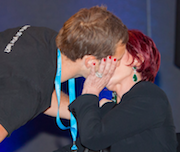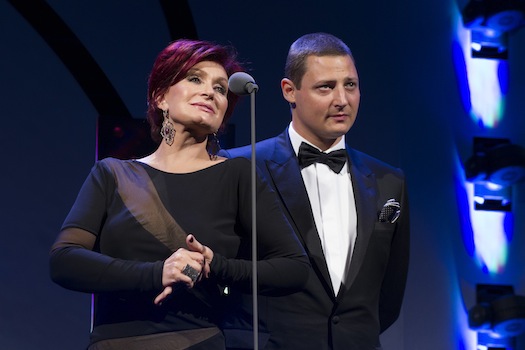Peter Saxon’s view of Radio’s big weekend.
It’s CRA’s big event of the year. It’s the exciting bit that provides relief from the humdrum business of lobbying boring institutions like government on behalf of a vibrant industry the rest of the time.
While only a relatively small group at the pointy end of the networks are aware of what is accomplished by CRA over the rest of the year, for the vast majority who work at the stations, the only contact they have with the industry’s peak body is over these two days in October.
Little wonder then that the indefatigable CEO of the CRA, Joan Warner has sought to put her stamp on these events since taking over the organisation a dozen or so years ago, and that a significant part of her position is defined by the success of it.
It is no small feat to satisfy, even in part, what is arguably Australia’s toughest room in the field of industry get-togethers. Everything from the food to the exhibition, to the sound and the quality of the paper in the loo is up for criticism.
The format has always been problematic, going from an awards dinner to a theatre ceremony and back to a dinner where presenters must compete with table talk and food service. Neither is perfect, but the latter is better.
A major point of contention each year is the line up of speakers at the conference and the presenters at the awards dinner.
As difficult as it is to get the balance of all these things just right, this year, in my opinion, it has come closer than ever before. It was partly because the sound worked, the presentations were slick and the majority of speakers at the conference were more knowledgeable and relevant than on past occasions.
But there was something else in the air that played a role in the weekend’s success – a new found camaraderie between networks exemplified by the moment when all of SCA’s giant contingent took CEO Rhys Holleran’s gracious lead to stand and applaud ARN’s triumph as WSFM’s Jonesy & Amanda were awarded the ACRA for Best On Air Team, Metro FM.
While radio remains as competitive as ever there is now a maturity that values a good competitor for helping to lift standards within the industry while understanding that the real enemy is not the other station, but other media.
Much of the arrogance that used to be displayed by the market leaders towards their less successful or smaller competitors has now been replaced by respect.
And that respect has been earned. Instead of capitulating to the great omnipotence that is SCA, both DMG and ARN have lifted their game. Both have developed a better defined network culture: dmg, since Lachlan Murdoch got involved and ARN since Ciaran Davis took the helm.
At Friday’s conference, I spoke to a few people who came to radio from a television background and they agreed that TV doesn’t put together a function like this where there is a genuine air of cooperation between the networks.
The Conference
Friday’s event, where it is customary to commence on a boring note with the current minister for communications or their shadow, Malcolm Turnbull, gave a polished and entertaining performance. He started by explaining his connection to radio, “My engagement with the radio industry began at an early age. My mother, Coral Lansbury, used to write radio dramas – serials like Portia Faces Life, The Reverend Matthew and many others.
“My own radio experience was a little more mundane. I began covering state parliament for 2SM in 1976, often with an early morning report into Steve Liebman and Brian White’s program,” said Mr Turnbull. You can read his speech here.
Someone who was there at the time recalled that Turnbull was being paid $12 per report.
People I spoke to were divided on Sharon Osbourne. For me, Sharon herself put it best when she spoke at the ACRAs about her appearance the previous day, “We didn’t talk about music, we didn’t talk about radio, we talked about Camilla Parker Bowles’ tits and Prince Charles’ willy.”
CRA defends spending rumoured six figure sums on luring big name celebrities to the conference by pointing to the publicity they generate for the event and the radio industry as a whole.
While that argument has merit, some question why those in the industry must sit through a whole hour of mildly amusing anecdotes about celebrity body parts. Fine for a TV chat show but out of context at a radio industry conference. By all means have her here if she pays for herself in publicity, but cut her back to half an hour or less at the conference so we can all get on to more important things.
For me the only real point of interest was in watching Angela Bishop’s masterful interviewing technique. BTW, she’ll be filling in for George and Paul on 2UE when they take their listener tour of China.
 I tell a lie, there was another interesting bit in Sharon Osbourne’s hour. During question time, a young man sitting close to me wearing rubber thongs and black T-shirt with the insignia 100things.com.au introduced himself as the guest speaker scheduled for 11:45.
I tell a lie, there was another interesting bit in Sharon Osbourne’s hour. During question time, a young man sitting close to me wearing rubber thongs and black T-shirt with the insignia 100things.com.au introduced himself as the guest speaker scheduled for 11:45.
He told the room that he had a list of things he has to accomplish – kissing a celebrity was one of them – would Ms Osbourne help him achieve this goal? She agreed. He sprinted on to the stage and she fulfilled his desire with enthusiasm. He has written up the experience in detail on his website.
When 11:45 rolled around, the young man, who identified himself as Sebastian Terry was indeed the guest speaker and went on to present an engaging story about his personal journey in pursuing the things he really wanted to do rather than tie himself to a corporate treadmill. And while that may seem as a rebuke for many in radio management, his message was actually to do with thinking outside the square in goal setting, leadership and community involvement.
All of the other sessions I saw that day provided some level of insight and information. James Manning’s fireside chat with DMG’s Cathy O’Connor and ARN’s Ciaran Davis set the tone that prompted my earlier remarks about the maturity and quality of the people at the top of the FM networks and the friendly rivalry, yet camaraderie, that exists between them. After all, they are involved in joint ventures in both Brisbane and Perth.
A session that included four of the top programmers in the country along with three on air teams about what makes a good on air team was thought provoking as was the session on how to get the best out of social media – which was ironically introduced by 2GB’s PD, David Kidd.
It would be remiss of me not to mention radioinfo’s own high profile contributor at the conference. Valerie Geller gave a riveting presentation from her book Beyond Powerful Radio which went beyond motherhood statements about keeping listeners interested.
Ms Geller provides practical how to’s – mainly questions you should ask yourself about talent. How do I know if someone would be good on a talk station? Ask yourself, would I want to spend five hours in a car with them? What’s a good on air topic? Would I talk about it, find it interesting, in my personal life? If not, why talk about it on air?
The ACRAs
Not much to grumble about here. Unusually for a radio event, the sound worked. The food was okay for something that has to be served up to 1,000 people all at once.
Merrick Watts gave good account of himself as the MC, as did all the presenters to follow. Merrick too, mentioned how rivalries have been put aside for this one night. He said, “It couldn’t have happened a few years ago.”
Guy Sebastian’s set was world class. Someone on our table observed that he could be this generation’s John Farnham.
The whole show went like clockwork. And although SCA, predictably won the lion’s share of awards, they had mercifully dispensed with last year’s mariachi band, leaving the other networks to cheer beyond their numbers every time one of their own was delivered a gong. It was all good fun.
There were only three minor things that detracted from proceedings.
Sorry to harp on about Sharron Osbourne, but I’ve been going to these events dating back to when Brian White himself was alive and I can’t recall a more wooden performance from a guest presenter, especially one that is billed as a ‘personality.’ Perhaps Buzz Aldrin was as wooden. But if you’ve been to the moon and back, you can get by without personality.
It wasn’t entirely her fault, but to demonstrate the detachment of a foreigner flown in to present awards in a country they know nothing about: when she read out Ray Hadley’s name for Best Talk Presenter, she went on to say from 2GB Sydney and then emphasised the letters “En Ess Double U” as if it had special meaning.
Another gripe – one that has never been resolved – is the rudeness shown by some in the room by talking loudly over any award presentation that doesn’t include their station or network. Graham Mott was hard pressed to be heard over the din as he presented the prestigious Brian White Memorial Award to 2UE’s Sarah Morice.
Derryn Hinch was a little louder and more forceful when later on he inducted Mott into the Hall of Fame, but still failed to quell the crowd completely.
The third issue is the number of high profile no-shows. While Jones opted out of the ACRAs some time ago, Kyle Sandilands, Matty Johns and Dave Hughes were all absent.
Also absent were regular supporters of the awards, Ray Hadley and Neil Mitchell. Both had called in sick. Hadley was in hospital, his condition unclear while Mitchell had an ear infection that prevented him from flying. But he did appear on a video to congratulate Mott on entering the Hall of Fame, a club in which Mitchell is already a member, as he remarked, “I think I’m the only one in the Hall of Fame that’s still got a job.”

Peter Saxon


Peter, many thanks for your kind words, and thanks to the CRA for including me this year! It was a lot of fun! Best to all, Valerie Geller